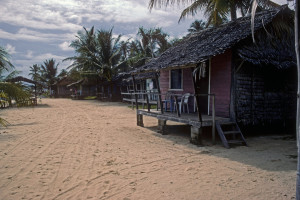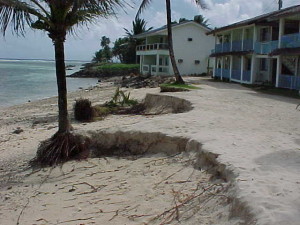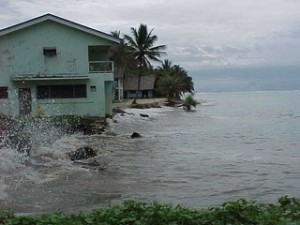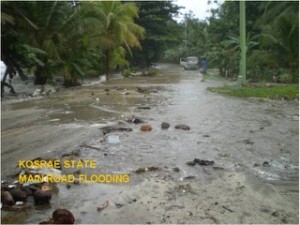By Shanty Asher
(Originally published in the San Diego Free Press on 2/23/2017)
I am a proud Pacific Islander. Over the years, I have witnessed and stood alongside many of my fellow islanders and leaders, combating climate change and its impacts on the islands. Though the percentage of people in the US believe that climate change is real and human-caused is rising, it still only amounts to around half. I have no doubt that if Americans had seen what we have seen, had lived what we have lived through, I believe that percentage would be higher. Much higher.

Today, I will share that story with you through an islander’s lens and maybe, just maybe, my story will paint a different picture of climate change; one that you may not have heard before; one that you can relate to because it is not a scientific prediction, but based on actual events.
As an islander, I see climate change’s impact and destruction on its face; it is already happening on our islands. I see it; so I believe that the climate has changed and continues to. As a Christian, I believe God is in control and I, so as many of my fellow islanders, must have faith and not question His work. Indeed, these are difficult and sensitive waters to navigate. Therefore, I will not attempt to dispute any of these views. Today, I only wish to raise a civil inquiry because I have witnessed too much and my empathy demands that I be concerned and speak out.
For the past 10 years, I have seen so many changes on our island; not only in the climate, but also that the size of our already tiny island is getting smaller. I am from a small island in the Federated States of Micronesia called Kosrae. It is located 1,360 miles southeast of Guam. Kosrae is a 42 square mile, single island, of lush, green and tropical trees; a home to approximately 7,000 of the friendliest people you will ever meet. Kosrae is part of the Federated States of Micronesia, a country that has had close ties with the United States since 1947, when it was formerly known as a Trust Territory of the Pacific Islands. Today, we are a sovereign country that continues to enjoy close diplomatic relations with the US, which I will forever be grateful for.

We are people with little material wealth, but we are deeply rooted in our values, culture, families, and untouched natural resources. These to us are priceless. Amongst these natural resources is the pristine, blue water that stretches out for miles into the horizon and wraps around our island. If there is one thing we are known for, it is that we, Pacific Peoples, are voyagers and that this pristine, vast, blue water unites us all. It is a beauty that is so dear to our hearts; one that we never thought would one day become a threat to our survival, a threat to our rights to live in and enjoy our islands.
My father, Sankey, is 61 years old today. He used to tell me stories of how the sandy beaches used to stretch out so far out that they could play mini baseball on the beach; baseball played with bats made of short old tree branches and a tennis ball. Fast forward to 30 plus years later, I played on those same beaches. While they no longer stretched out far for us to enjoy a game of mini baseball, 10 yards was still enough for families to come together, play beach volleyball, grill, and watch the kids play and swim. Today, if we are lucky, during low tides, we see sand in few locations.

So while the American public is divided on this issue, we islanders know what we see. I do not need science to tell me the ocean levels have risen, as I have watched our sands repeatedly devoured by high tides due to sea level rise. I do not need science to predict that seawater will one day destroy our homes as many houses along the coastlines have already been destroyed. I do not need science to predict the impacts of climate change on our way of life as I have witnessed farmers lose their crops, their only source of food and income, because salt water has inundated the groundwater and destroyed their crops. We islanders know climate change is not a theory; our shorelines are disappearing, our sustainable farming lifestyles are being threatened, our public roads and homes are attacked by the rising sea level. This is our reality. We are not scientists, we are survivalists.
The Pacific Island countries are developing countries; governments and stakeholders are consistently challenged in their duty to diligently serve and provide for their people while simultaneously battling this cross-cutting issue of climate change that is threatening our livelihood and existence. This is an uphill battle for us because we are small and have little influence and power in the international community. However, when we continue to share our stories, we move people; people like you, like the SanDiego350 people I’ve met, and the great state of California, where I currently live.
This is no longer a small islands’ issue; many countries are taking risks and bold steps to address and combat climate change not because science tells them to, but because they either personally suffered from these changes or they empathize with people like me and thousands of others in the Republic of Kiribati and Republic of the Marshall Islands who are being evacuated from their homes. These empathetic actions, I think, are the Christian values that we must underscore during these challenging times. When we see thousands of people fighting for survival, the Christian thing to do is extend your hand and help. We also see the international community, nations like the US and Australia, lending support both financial and political, to help in this fight. These nations pledged to cut back on carbon emissions and increase the use of renewable energy, which are natural resources that God provided for us to use in the first place. I am proud to currently reside in one of the states that puts their children and grandchildren’s future first. Yes, it may be economically beneficial and comfortable to continue the lifestyle we have grown accustomed to, but at the cost of giving up our children’s future and livelihood? Our actions today make a huge impact on their lives tomorrow. If there’s one thing we all have in common in this fight, it is that we want to leave a safe and good home for our kids to enjoy.

As a Christian, I will not ask why things are the way they are. The only “why” I am asking, and that I ask you to ask is: “Why should we not respect and take care of this home we are given?” Is it not our duty to protect this planet so our kids can inherit a safer and cleaner place to call home? As a Christian, a mother of 3 beautiful daughters, a concerned Pacific Islander and global citizen, I can’t stand idle knowing others are suffering. I will hope and pray; at the same time I will fight for a cause that may increase my daughters’ chances of returning home and enjoying Kosrae. The climate change movement’s goal is for us to become more responsible in our use of God’s natural resources so that we can leave a better place for our children and grandchildren to enjoy. Are these not sufficient reasons to support the cause?
Ten years from now, I hope that because of the selfless acts and sacrifices we make today, we have left a better environment and home for our grandchildren.
Shanty Sigrah Asher is the oldest of 7 siblings, blessed with amazing parents, Deborah and Sankey, from the Federated States of Micronesia (FSM). She was born and raised on the islands and will forever be proud of that. She, her husband, and their three daughters have resided in San Diego since 2015 so that she can pursue a degree in International Law at the Thomas Jefferson School of Law.
